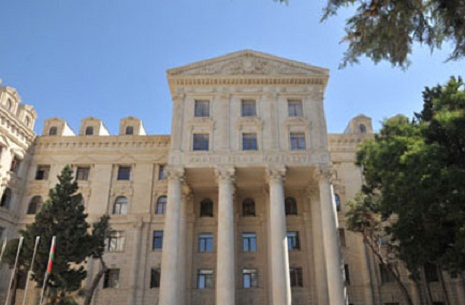Azerbaijan

The report said the 2014 priorities also included addressing the consequences of the Armenian aggression against Azerbaijan, preventing external threats to Azerbaijan’s independence and sovereignty, and development of bilateral, regional and international relations.
“Protection of national interests, creation of equal relations in line with the norms and principles of international law, non-interference in the domestic affairs of other states remain as the main principles of Azerbaijan’s foreign policy,” the report read.
The report said that numerous reciprocal official and state visits were carried out, the list of Azerbaijan’s diplomatic missions abroad was expanded and the work with international organizations continued in 2014.
The ministry said in its report that the year 2014 is characterized by the growth of conflicts and escalation of tension in international relations, as well as a tendency to deepen the collapse of the military-political blocs.
“New flashpoints of tension, instability and conflict emerged near the borders of Azerbaijan, and a black PR campaign was conducted against Azerbaijan under the influence of certain circles,” the ministry said in its report. “Despite all this, in 2014, the implementation of the country’s successful independent foreign policy continued.”
Negotiations on the peaceful settlement of Armenian-Azerbaijani Nagorno-Karabakh conflict continued in 2014, said the report.
During the high-level meetings held on the initiative of OSCE Minsk Group co-chairing countries, the sides were urged to start the work on the Great Peace Agreement, according to the Foreign Ministry’s report.
Azerbaijan has repeatedly expressed readiness to start work on this agreement. Despite the existence of positive trends for the conflict’s settlement, Armenia continues to adhere to the non-constructive position, said the report.
The Foreign Ministry’s report said that Armenia purposefully and intensively violates the ceasefire in order to maintain the status quo.
Armenia has held large-scale military exercises on Azerbaijan’s occupied territories, said the report.
Azerbaijan also continued its efforts to achieve the international recognition of the fact of occupation of its territories and to communicate to the world the truth about the Nagorno-Karabakh conflict, said the Foreign Ministry.
Azerbaijani Foreign Ministry said that it will continue the efforts to achieve the release of Dilgam Asgarov and Shahbaz Guliyev, the Azerbaijanis taken hostage by Armenians in the Kalbajar district.
The conflict between the two South Caucasus countries began in 1988 when Armenia made territorial claims against Azerbaijan. As a result of the ensuing war, in 1992 Armenian armed forces occupied 20 percent of Azerbaijan, including the Nagorno-Karabakh region and seven surrounding districts.
The two countries signed a ceasefire agreement in 1994. The co-chairs of the OSCE Minsk Group, Russia, France and the US are currently holding peace negotiations. Armenia has not yet implemented the UN Security Council`s four resolutions on the liberation of the Nagorno-Karabakh and the surrounding regions.














































